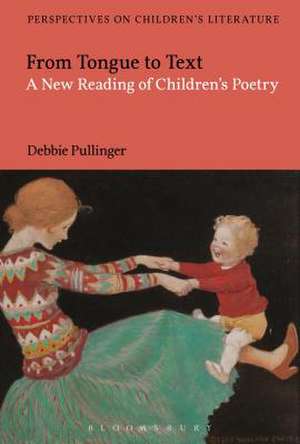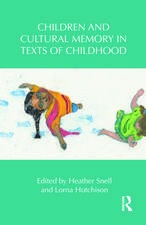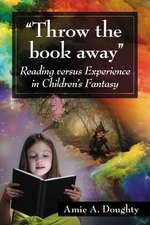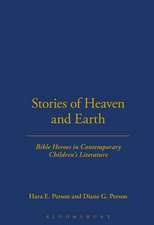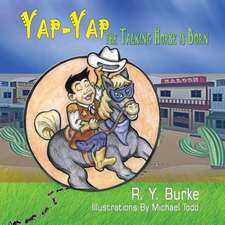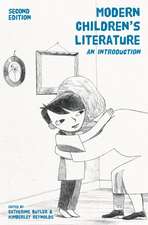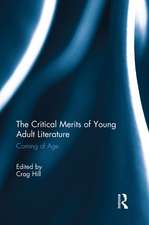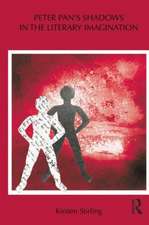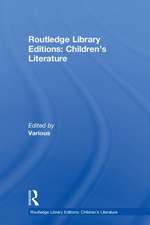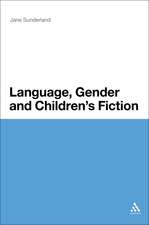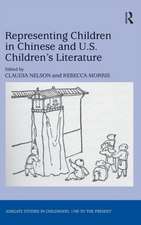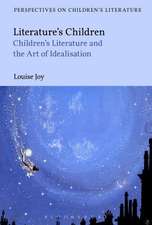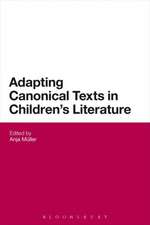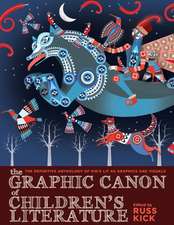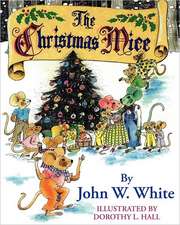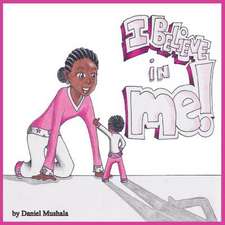From Tongue to Text: A New Reading of Children's Poetry: Bloomsbury Perspectives on Children's Literature
Autor Debbie Pullingeren Limba Engleză Paperback – 28 noi 2018
| Toate formatele și edițiile | Preț | Express |
|---|---|---|
| Paperback (1) | 238.40 lei 6-8 săpt. | |
| Bloomsbury Publishing – 28 noi 2018 | 238.40 lei 6-8 săpt. | |
| Hardback (1) | 774.62 lei 3-5 săpt. | |
| Bloomsbury Publishing – 3 mai 2017 | 774.62 lei 3-5 săpt. |
Preț: 238.40 lei
Preț vechi: 306.10 lei
-22% Nou
Puncte Express: 358
Preț estimativ în valută:
45.62€ • 47.53$ • 37.93£
45.62€ • 47.53$ • 37.93£
Carte tipărită la comandă
Livrare economică 08-22 februarie 25
Preluare comenzi: 021 569.72.76
Specificații
ISBN-13: 9781350092198
ISBN-10: 1350092193
Pagini: 280
Ilustrații: 11 b/w illustrations
Dimensiuni: 156 x 234 x 14 mm
Greutate: 0.4 kg
Editura: Bloomsbury Publishing
Colecția Bloomsbury Academic
Seria Bloomsbury Perspectives on Children's Literature
Locul publicării:London, United Kingdom
ISBN-10: 1350092193
Pagini: 280
Ilustrații: 11 b/w illustrations
Dimensiuni: 156 x 234 x 14 mm
Greutate: 0.4 kg
Editura: Bloomsbury Publishing
Colecția Bloomsbury Academic
Seria Bloomsbury Perspectives on Children's Literature
Locul publicării:London, United Kingdom
Caracteristici
Includes readings of poems by writers such as A.A. Milne, Michael Rosen and Carol Ann Duffy
Notă biografică
Debbie Pullinger is Research Associate in the Faculty of Education at the University of Cambridge, UK.
Cuprins
IntroductionChildren's Poetry: the problem childMind and BodyPart One: TactThe Hidden ChildNot NarrativeIn our right minds?The infancy of languageThe language of infancyThe crossingThe containerTactful languagePart Two: TongueEar and voiceOrality and vocalityAnd another thingMaking listsAgain and againHere and nowAll join in!Live and in performancePart Three: TextHand and eyeFrom performance to pageFrom A to ZThe poetics of the pageThe distances of textThe child and the textConclusionGlossaryBibliographyIndex
Recenzii
In a brief closing section, Pullinger returns to the idea of 'tactful reading' to argue that children's poetry is best understood, not through arm's-length theories, but through methodologies that are grounded in 'commitment, immersion, abandonment, trust' . This is an ambitious conclusion to an ambitious study. Its success reflects the author's broad knowledge of contemporary British poetry as well as her willingness to draw from multiple academic perspectives. While the study of children's literature is flourishing, it remains divided among the disciplines of education, literary criticism, history, and psychology. From Tongue to Text is itself an act of 'integrated reading' that crosses disciplinary lines to make a strong case for the value and complexity of children's poetry.
This book is a rather thrilling call to take poetry for children seriously - that is, not earnestly, but with an appetite to see its fullest implications. Unafraid to engage with theory, the argument is anything but cerebral. Rather, it leads the mind back to the body, to its play and humour and its tactile wrestling with experience. Almost incidentally, it opens up the possibility that this approach illuminates all poetry, for any age, and that children's poetry might be not a marginal art but the key.
This is the first extensive theoretical exploration of that most intractable area of literary studies, poetry for children, and it should be essential reading for everyone in the field of children's literature. it draws on a remarkable range of literary and linguistic theory to produce, a new way of reading and of understanding the genre: 'the idea of a fully engaged sort of criticism.' From Tongue to Text is that rare thing: a book which marks an important step in critical thinking, and which is readable and accessible, and which above all is original
In describing the "fractal-like patterns" of Sing-Song, Debbie Pullinger suddenly makes Christina Rossetti's classic volume come newly alive. By foregrounding reverberating cyclical repetitions of time, life and the universe, her account makes the sequence of crystalline variations metaphorically visible. Throughout From Tongue to Text, Pullinger provides many more such refreshing rereadings of verse we thought we knew, while bravely attempting to answer the impossible question of defining children's poetry. By deftly engaging connections between orality and literacy, between child and adult between sound and printed text, Pullinger provides a welcome addition to the body of work emerging on theorizing children's poetry. For people who have From the Garden to the Street (1997) by Morag Styles and Poetry's Playground (2007) by Joseph Thomas on their shelves, make a space for Debbie Pullinger's From Tongue to Text to sit next to them
This book is a rather thrilling call to take poetry for children seriously - that is, not earnestly, but with an appetite to see its fullest implications. Unafraid to engage with theory, the argument is anything but cerebral. Rather, it leads the mind back to the body, to its play and humour and its tactile wrestling with experience. Almost incidentally, it opens up the possibility that this approach illuminates all poetry, for any age, and that children's poetry might be not a marginal art but the key.
This is the first extensive theoretical exploration of that most intractable area of literary studies, poetry for children, and it should be essential reading for everyone in the field of children's literature. it draws on a remarkable range of literary and linguistic theory to produce, a new way of reading and of understanding the genre: 'the idea of a fully engaged sort of criticism.' From Tongue to Text is that rare thing: a book which marks an important step in critical thinking, and which is readable and accessible, and which above all is original
In describing the "fractal-like patterns" of Sing-Song, Debbie Pullinger suddenly makes Christina Rossetti's classic volume come newly alive. By foregrounding reverberating cyclical repetitions of time, life and the universe, her account makes the sequence of crystalline variations metaphorically visible. Throughout From Tongue to Text, Pullinger provides many more such refreshing rereadings of verse we thought we knew, while bravely attempting to answer the impossible question of defining children's poetry. By deftly engaging connections between orality and literacy, between child and adult between sound and printed text, Pullinger provides a welcome addition to the body of work emerging on theorizing children's poetry. For people who have From the Garden to the Street (1997) by Morag Styles and Poetry's Playground (2007) by Joseph Thomas on their shelves, make a space for Debbie Pullinger's From Tongue to Text to sit next to them
